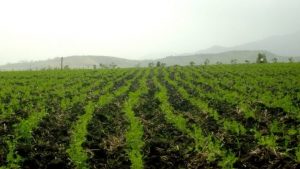Pesticides, designed to combat pests and improve agricultural production, have shown to have a significant negative impact on ecosystems. Although their use has spread worldwide to ensure food security, various studies warn about their adverse effects on plants, animals, and microorganisms.
Before the Industrial Revolution, agriculture maintained a natural balance with the environment through crop rotation and biological pest control. However, agricultural modernization and increased food demand drove the massive use of pesticides, affecting not only target species but also hundreds of organisms essential for biodiversity.
A study published in Nature Communications by the East China University of Science and Technology analyzed over 1,700 studies on 471 types of pesticides. The results show that pesticides affect more than 800 terrestrial and aquatic species, altering their growth, reproduction, and behavior. Additionally, they can damage cellular metabolism and reduce organism populations, contributing to the biodiversity crisis.
Ecologist Ben Woodcock, from the UK Centre for Ecology and Hydrology, pointed out that pesticides are “a necessary evil” for food production but warned about the urgency of adopting policies to reduce their use.

Sustainable Alternatives to Reduce Pesticide Use
The study suggests various strategies to minimize dependence on pesticides, including organic farming, which already represents more than 10% of production in the European Union. Recommended practices include:
- Promotion of natural predators: Planting wildflowers and creating habitats for beneficial insects can help control pests naturally.
- Crop rotation: This technique disrupts pest life cycles, reducing their impact.
- Use of physical barriers: Nets and other methods can prevent crop damage without the need for chemicals.
- Biological control: Introducing species such as ladybugs and nematodes helps control pests without resorting to pesticides.
The study emphasizes the need for new agricultural technologies, such as pest monitoring through artificial intelligence, to reduce dependence on pesticides. Transitioning to more sustainable methods is key to preserving biodiversity without compromising global food security.
 protect crops
protect crops
How to Achieve Sustainable Agriculture?
Sustainable agriculture can be achieved through practices that protect the soil, conserve water, and reduce pollution. It is also important to use innovative technologies and promote the consumption of organic and ecological products.
Sustainable Agricultural Practices
- Crop rotation
- Utilizing soil conservation techniques
- Using organic fertilizers
- Implementing Integrated Pest Management (IPM)
- Practicing no-till farming
- Implementing contour or reduced tillage
Sustainable Technologies
- Using drones, efficient irrigation systems, and sensors
- Adapting irrigation systems to climate change
One can also opt for sustainable consumption by preferring organic and ecological products, buying local products, consuming more plant-based products, and creating an urban garden.
Additionally, activities to support sustainability can be carried out, such as planting trees, engaging in ecological hikes, and participating in activities that promote environmental awareness.
Do you already know our YouTube channel? Subscribe!

